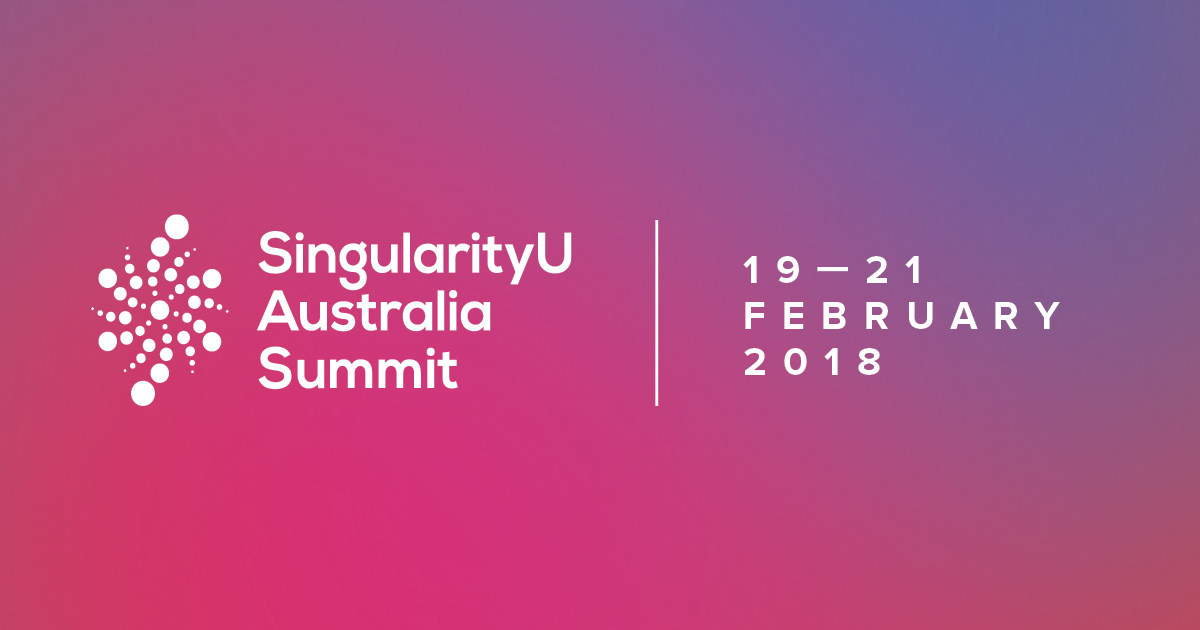
My Exponential and Abundant Learning at #SUAU18 - UNDERSTAND. ADAPT. THRIVE.
Re-spect means to look again so for me the SingularityU Australia Summit was the convergence of transformative thinking from experts in artificial intelligence, technology, robotics, medicine, biotechnology, criminology, public policy. The experience empowered me to appreciate and visualise where we’ve come, where we’re going, and what’s possible for humanity in the face of accelerated change and technological empowerment. As an educational leader charged with opening a new school, it is imperative for me to stay informed, aware and resilient because the future is now. We owe it to our learners to arm them with the the permission to imagine, a growth mindset and the adaptable skills they need to engage with the, yet to be imagined, exponentially technological and innovative opportunities of tomorrow.

"The future is limitless. We need to encourage the imaginations of our children to shape this future with hope and possibilities." - Edie Weiner
Our world is no longer on the cusp of exponential change, it is well within it! Moore’s Law dictates exponential growth and both the rate of improvement and amplification potential of technological advances is no longer linear. It would seem that we will be in a global place of inequity in terms of technology and resources but Tiago Mattos challenges this mindset with a mental model of abundance, rather than one of scarcity. As the primary leader of learning at Matua Ngaru School it is essential that I ensure that our systems are designed with this in mind and this will first require careful unpacking of our vision and alignment of this to everything we do. What do we believe as a school community?
“The first step to making a difference is realising we actually can, realising one person can make a change and that we need to show up and stand up for what is right.” ~David Roberts
What will we do at Matua Ngaru School to expand horizons through imagination, to say ‘yes’, to foster creativity, to solve problems, to get it wrong to get it right and to nurture wonderful, compassionate, critically thinking human beings who want to contribute positively to the world by believing they can make a difference? I hope to develop a curriculum and pedagogical approach that makes Matua Ngaru School a ‘billionaire’ school that grows kind, curious change agents who can collectively touch a billion lives. So how can we become a place that nurtures the soft skills that future work will require? Our NZC is a wonderful guide, especially the values, principles and key competencies which will frame our learning design and ready our learners for work in the future spaces Edie Weiner predicts as vertical farmers, food printing specialists, compost designers, global policy makers or even AI food designers!‘
In addition, the opportunities that our vision of ‘ubiquitous learning, on a wave of change’ affords are #limitless. We have a wonderful community where we can innovate- looking at the things that matter to our learners. Will our school be a place where ideas will be born, ideated, prototyped, tested, failed and iterated again? Yes! I believe that we will make our school a place that breathes the philosophy that ‘you can’t break an idea’, where you can contribute to science as a child by being bio-curious or acting as a citizen scientist and a place that is forever on a wave of change. What an exciting place this will be! Impossible = I’m possible. Let’s be #futurehunters!!
"I'm very optimistic. The best is yet to come – but there's one area I'm worried about... A crisis of imagination. Because of exponential technologies, your reach exceeds your imagination. So the biggest risk is not thinking big enough." – Amin Toufani
#ubiquitous #abundance #disruption #globalgrandchallenges #4DPrinter #ubiquitousrobotos #virtualVERSUSreality #innovate #MooresLaw #everythingisenergy #bio-curious #limitless #futurism #youcan’tbreakanidea #templosion #bebrave #exponential #liquidbiopsy #citizenscientists #cryptocurrency #BAANGFUEL #hackitup #re-spect #convergence #waitbutwhy #cyborg #humanity #compassion
